Find Help
More Items From Ergsy search
-
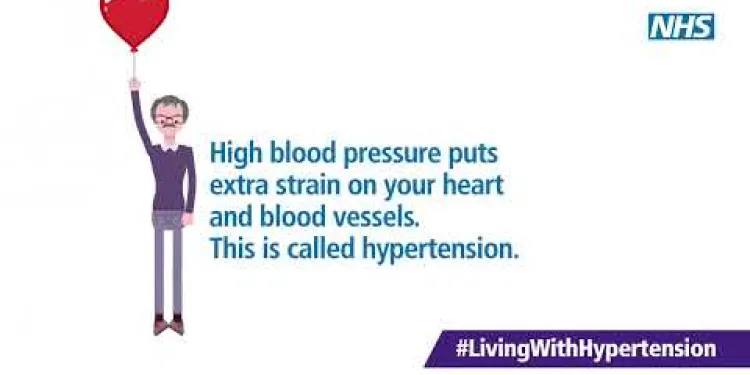
Blood pressure too high? Living with hypertension animation
Relevance: 100%
-

Can high blood pressure be prevented?
Relevance: 61%
-

How is high blood pressure diagnosed?
Relevance: 61%
-
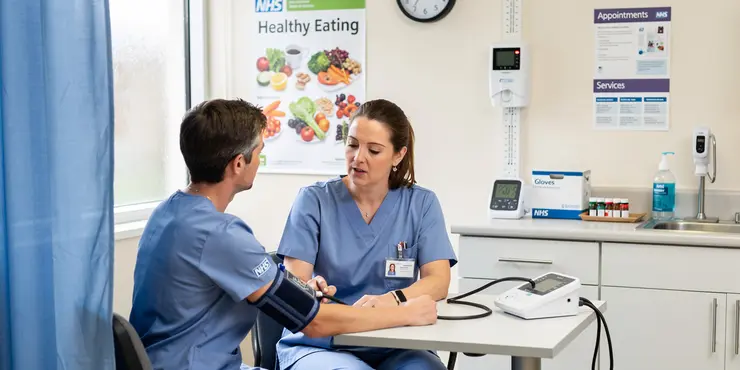
Does caffeine affect blood pressure?
Relevance: 60%
-

Should I test my child for high blood pressure?
Relevance: 60%
-
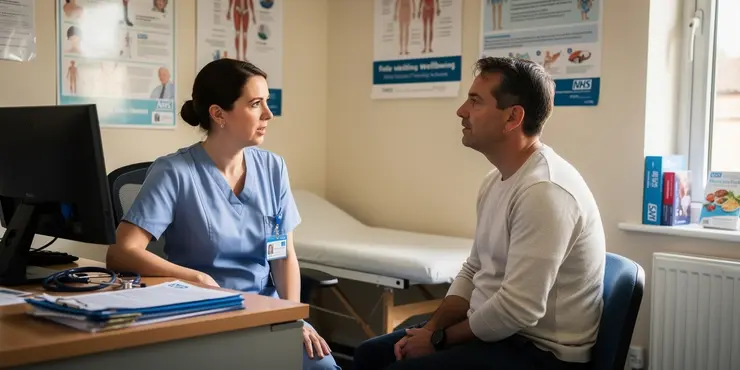
What causes high blood pressure?
Relevance: 58%
-
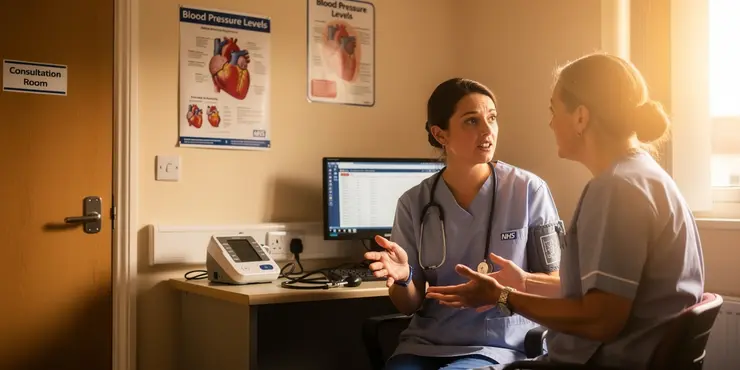
What is high blood pressure?
Relevance: 58%
-
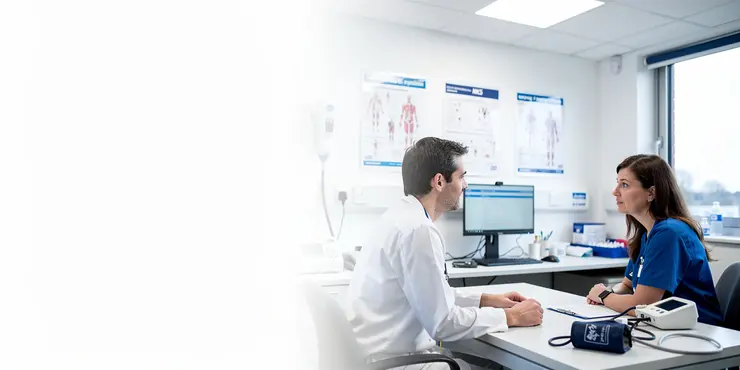
How can high blood pressure be treated?
Relevance: 58%
-
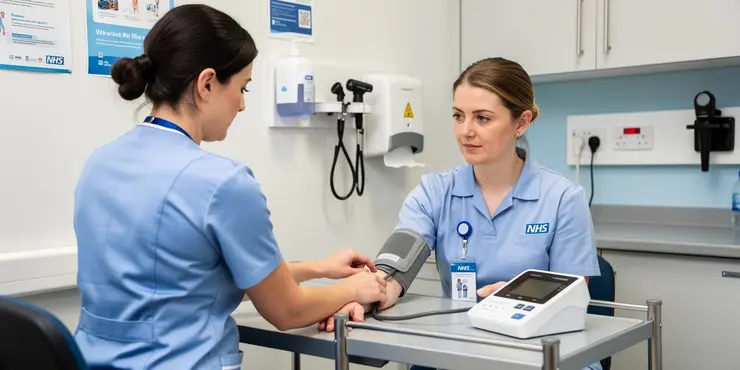
How often should I check my blood pressure?
Relevance: 57%
-
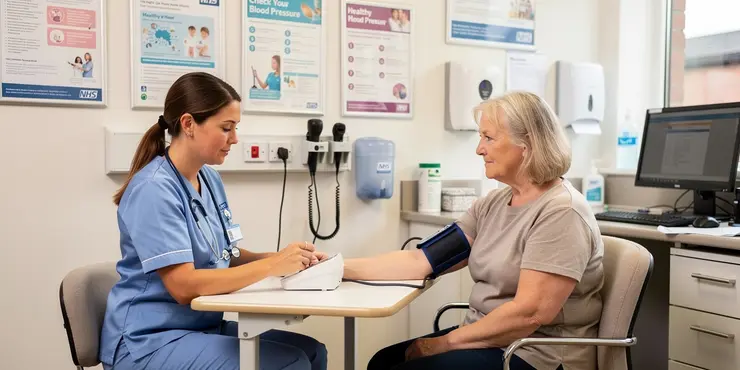
What are the risks of having high blood pressure?
Relevance: 57%
-
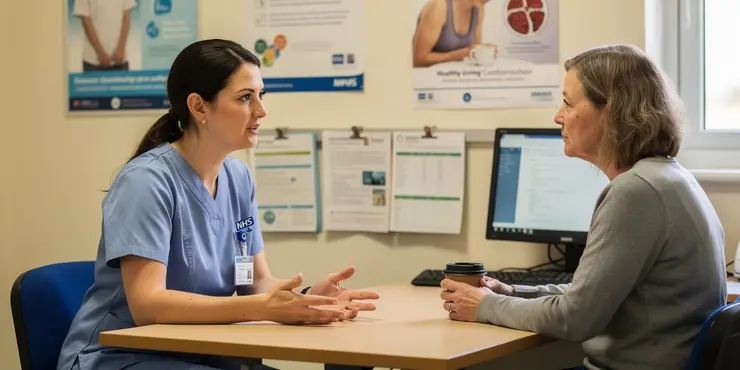
What is the recommended number of coffee cups per day for hypertensive individuals?
Relevance: 55%
-
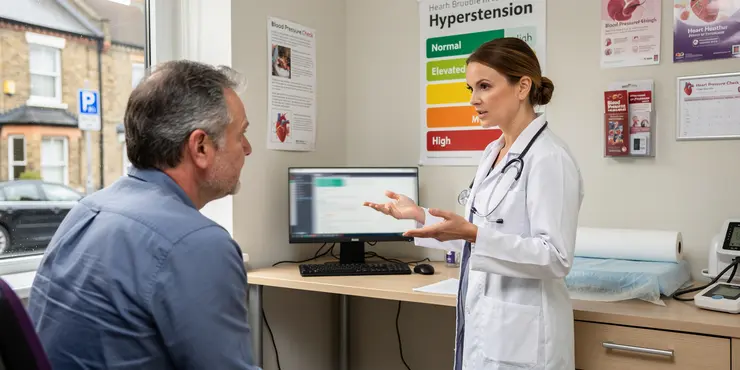
Can high blood pressure lead to other health problems?
Relevance: 55%
-
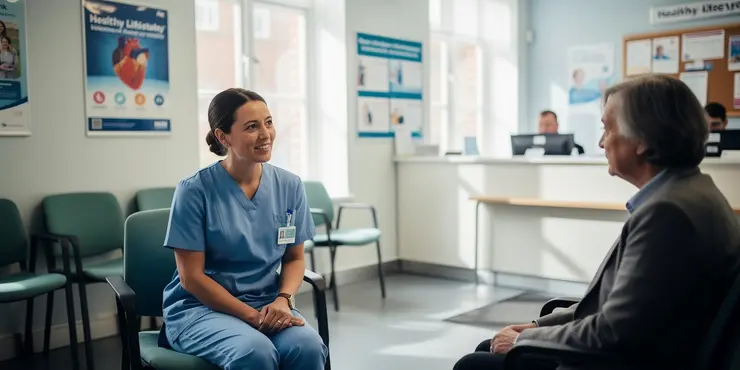
Is Your Morning Coffee a Risk Factor for High Blood Pressure?
Relevance: 54%
-
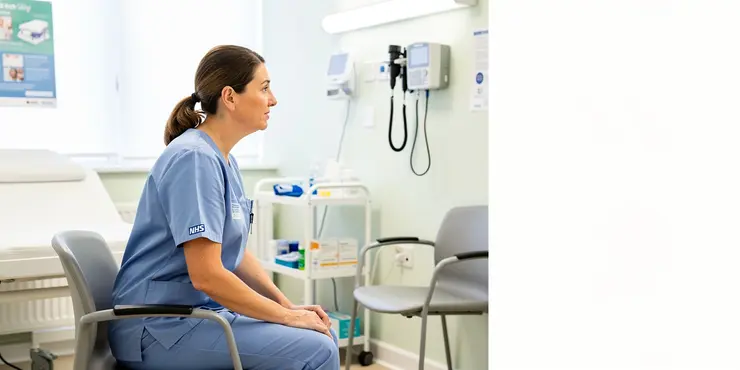
Are there any other factors in coffee that may affect blood pressure?
Relevance: 54%
-
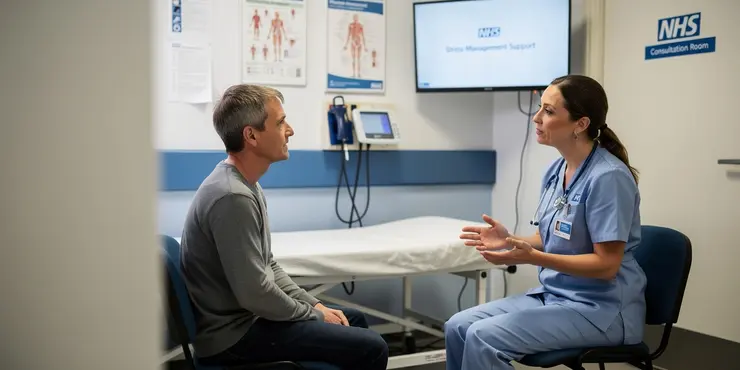
Can stress cause high blood pressure?
Relevance: 54%
-
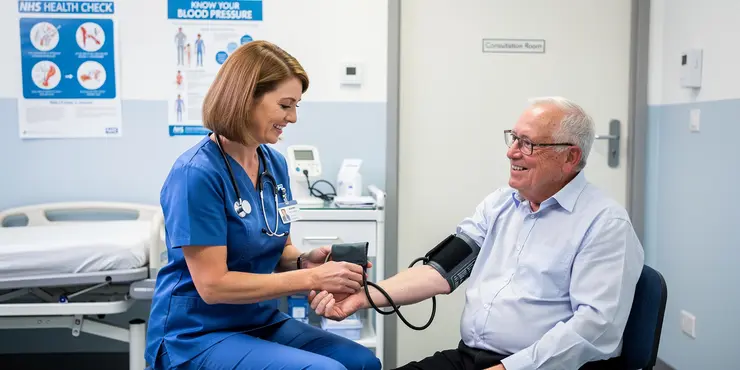
How to take someone's blood pressure
Relevance: 54%
-

How does diet affect blood pressure?
Relevance: 53%
-
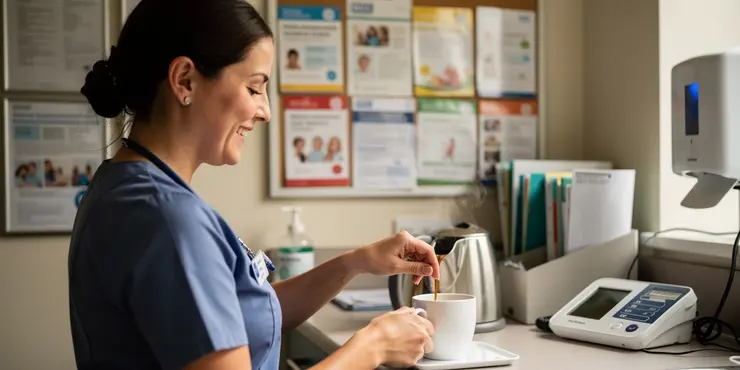
How soon after drinking coffee can blood pressure be affected?
Relevance: 53%
-

What lifestyle changes can lower blood pressure?
Relevance: 53%
-
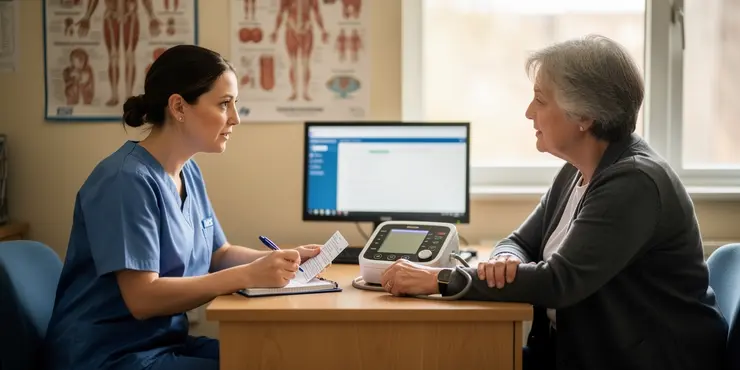
Is it safe to take blood pressure medication with coffee?
Relevance: 53%
-
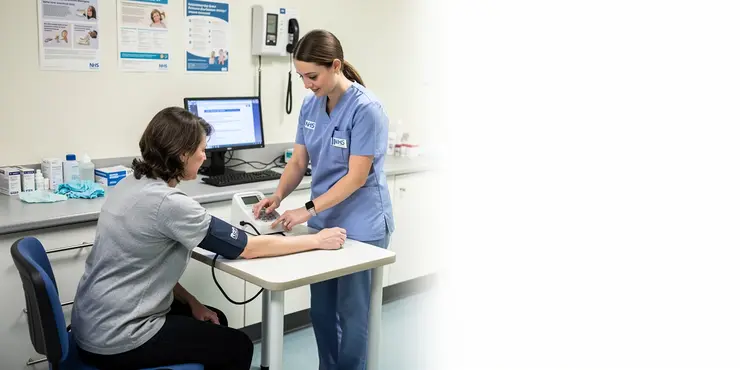
Seven Reaasons For Measuring blood pressure
Relevance: 53%
-
What is the ideal salt intake for someone with high blood pressure?
Relevance: 53%
-
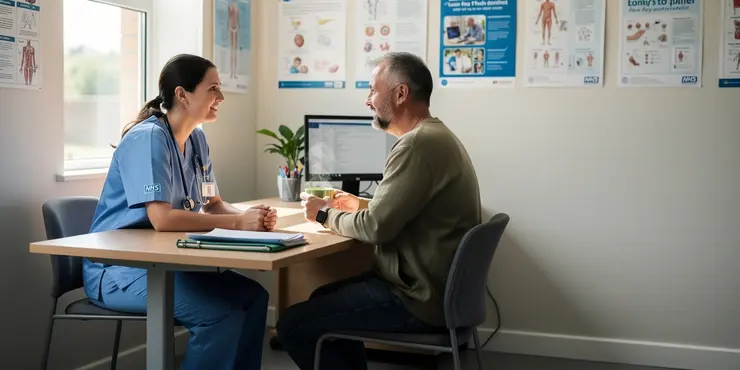
Is green tea a better alternative to coffee for blood pressure management?
Relevance: 53%
-

Why is high blood pressure called a 'silent killer'?
Relevance: 52%
-
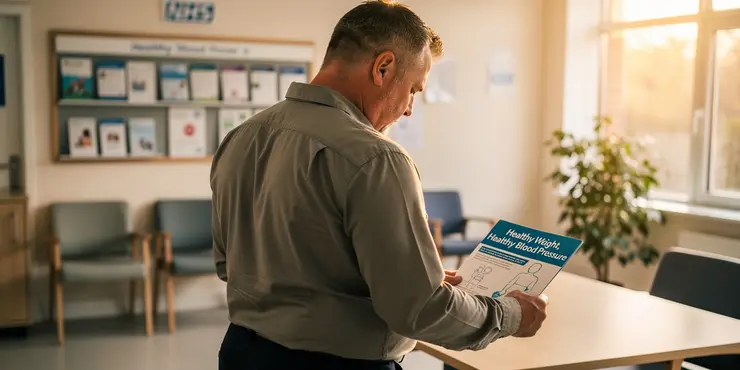
Can weight loss help reduce high blood pressure?
Relevance: 52%
-

Can decaffeinated coffee affect blood pressure?
Relevance: 52%
-
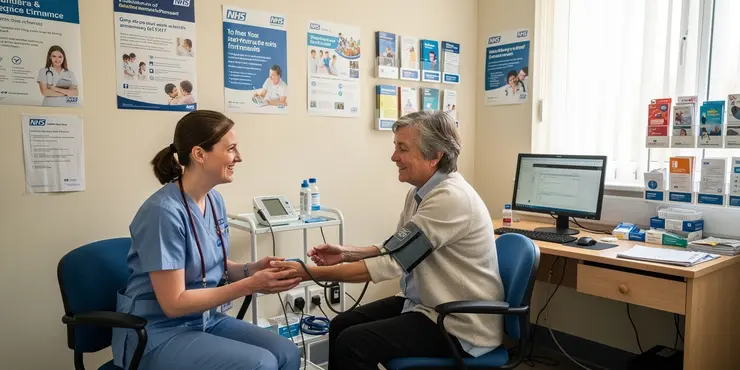
How does caffeine affect blood pressure?
Relevance: 52%
-
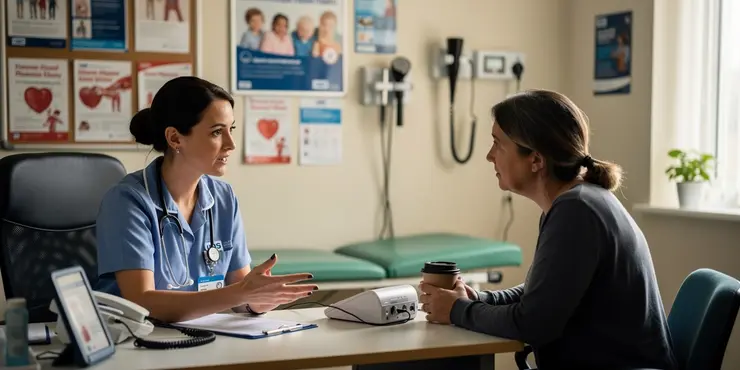
How can one minimize the impact of coffee on blood pressure?
Relevance: 52%
-
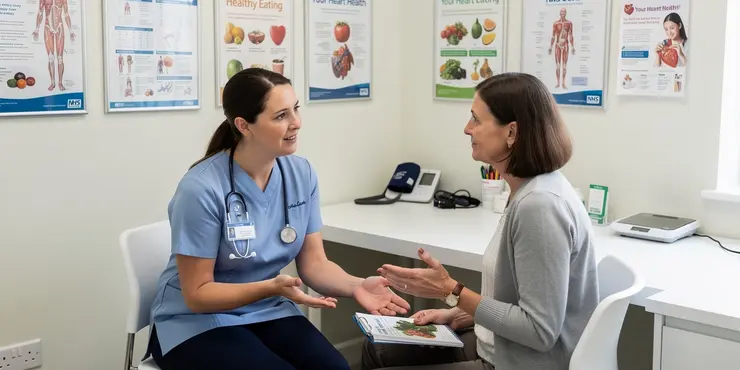
What is the role of potassium in managing blood pressure?
Relevance: 52%
-
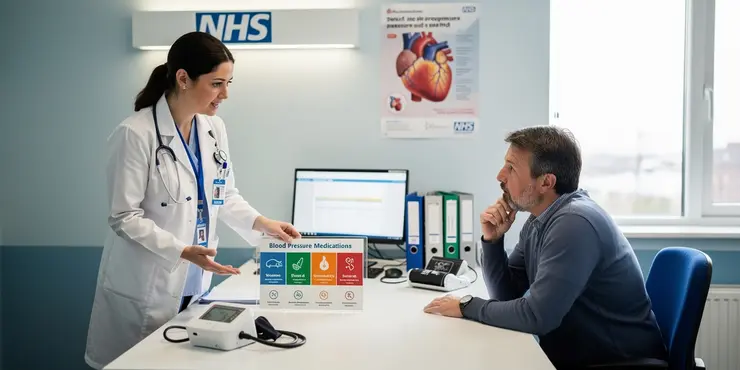
How do medications help control high blood pressure?
Relevance: 51%
-
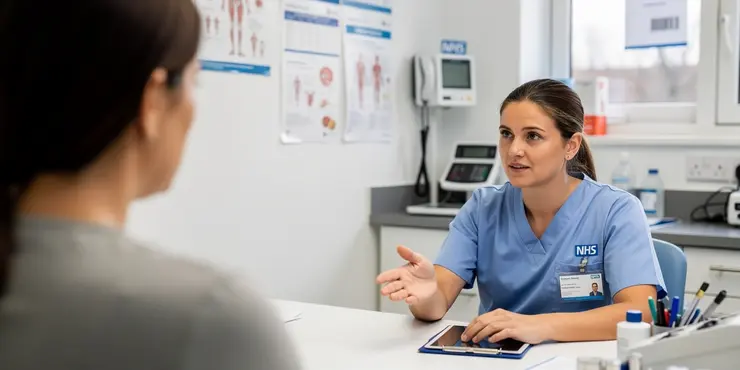
How much caffeine is generally considered safe for people with high blood pressure?
Relevance: 50%
-
How does salt impact blood pressure?
Relevance: 50%
-

How does regular caffeine consumption impact tolerance and blood pressure?
Relevance: 50%
-

Should people with high blood pressure avoid coffee entirely?
Relevance: 50%
-
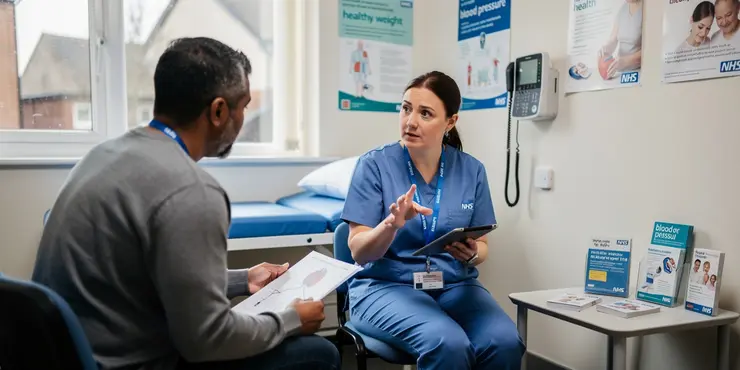
Can weight loss drugs affect blood pressure?
Relevance: 50%
-

Is there a specific time of day when coffee has the most impact on blood pressure?
Relevance: 49%
-

Is high blood pressure hereditary?
Relevance: 46%
-
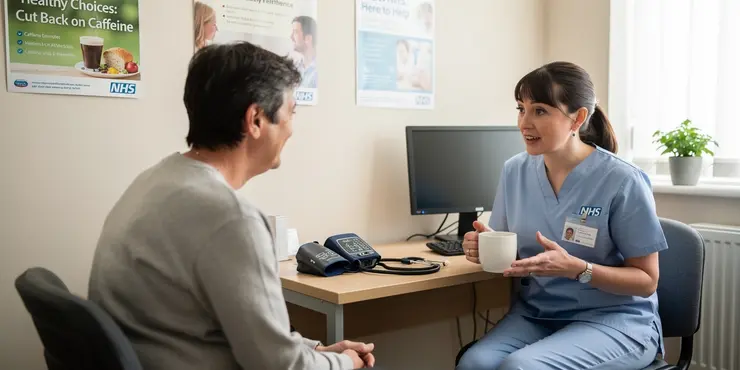
Does drinking coffee every morning increase the risk of developing high blood pressure?
Relevance: 46%
-
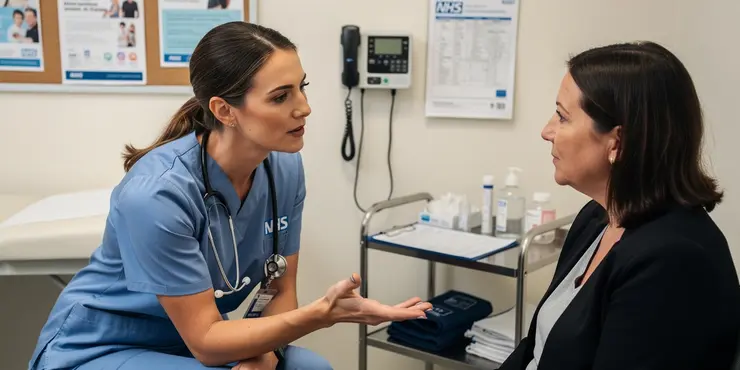
Does genetic makeup affect how coffee impacts blood pressure?
Relevance: 44%
-
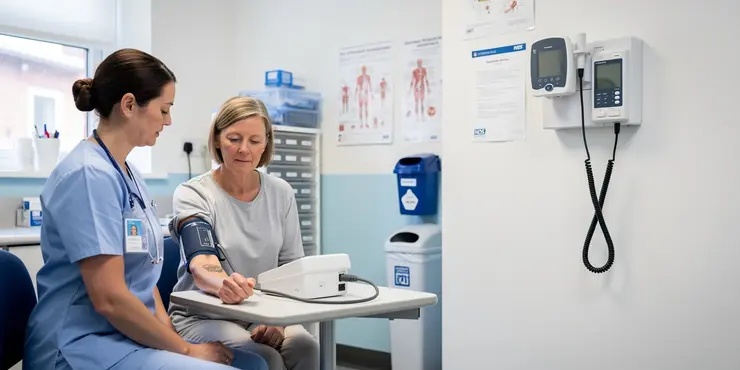
What are normal blood pressure ranges?
Relevance: 43%
Blood Pressure Too High? Understanding and Managing Hypertension
What is Hypertension?
Hypertension, commonly known as high blood pressure, is a condition where the force of the blood against the artery walls is consistently too high. Blood pressure is measured in millimeters of mercury (mmHg) and recorded with two numbers: systolic pressure over diastolic pressure. For adults in the United Kingdom, a normal blood pressure reading is typically around 120/80 mmHg. Hypertension is diagnosed if repeated readings are consistently above 140/90 mmHg.
Causes and Risk Factors
Several factors can contribute to hypertension, including genetics, age, lifestyle, and existing health conditions. Risk factors include a high-salt diet, lack of physical activity, obesity, excessive alcohol consumption, smoking, and stress. Conditions such as diabetes and kidney disease also increase the risk of developing high blood pressure.
Effects of Hypertension
Hypertension is often called the "silent killer" because it usually has no symptoms but can lead to serious health problems. Untreated high blood pressure increases the risk of heart disease, stroke, kidney disease, and vision loss. Regular monitoring and management are crucial to prevent these complications.
Managing Hypertension
Effective management of hypertension often involves lifestyle changes and, when necessary, medication prescribed by a healthcare professional. Here are some key strategies:
- Healthy Diet: Follow a balanced diet low in salt, saturated fats, and cholesterol. The DASH (Dietary Approaches to Stop Hypertension) diet is highly recommended.
- Regular Exercise: Aim for at least 150 minutes of moderate-intensity aerobic activity, such as brisk walking, cycling, or swimming, each week.
- Weight Management: Maintaining a healthy weight can significantly reduce blood pressure.
- Limit Alcohol Intake: Stick to the recommended limits of no more than 14 units of alcohol per week.
- Quit Smoking: Smoking cessation can improve overall cardiovascular health.
- Stress Management: Practice relaxation techniques such as yoga, mindfulness, and deep breathing exercises.
Medication and Regular Check-Ups
In some cases, lifestyle changes alone may not be sufficient to control hypertension. Medications, including diuretics, ACE inhibitors, beta-blockers, and calcium channel blockers, can help manage blood pressure levels effectively. Regular check-ups with a healthcare provider are essential for monitoring and adjusting treatment plans as needed.
Living with Hypertension
Living with hypertension requires a proactive approach to health management. Stay informed about your condition, adhere to prescribed treatments, and make necessary lifestyle changes. Monitoring your blood pressure at home can also help you track your progress and take immediate action if levels become concerning. With proper management and support, individuals with hypertension can lead healthy, active lives.
Conclusion
High blood pressure is a manageable condition if addressed promptly and correctly. By adopting a healthy lifestyle, adhering to medical advice, and regularly monitoring blood pressure, individuals can control hypertension and reduce the risk of severe health complications.
Blood Pressure Too High? Learn About and Manage It
What is High Blood Pressure?
High blood pressure, also called hypertension, means the blood pushes too hard against the walls of the arteries. Blood pressure is shown with two numbers. A normal reading for adults is around 120/80 mmHg. If it is more than 140/90 mmHg many times, it is called hypertension.
What Causes High Blood Pressure?
Many things can cause high blood pressure. These include family history, age, lifestyle, and certain health issues. Risk factors are eating too much salt, not being active, being overweight, drinking too much alcohol, smoking, and stress. Diabetes and kidney problems can also cause high blood pressure.
What Can High Blood Pressure Do?
High blood pressure can be dangerous because it often does not show symptoms. But it can cause heart problems, stroke, kidney disease, and eyesight loss. It is important to watch your blood pressure and keep it under control to avoid these health issues.
How to Manage High Blood Pressure
To manage high blood pressure, you may need to change some habits and take medicine from a doctor if needed. Here are some tips:
- Eat Healthy: Eat a diet low in salt, unhealthy fats, and cholesterol. Try the DASH diet which is good for high blood pressure.
- Exercise Regularly: Be active for at least 150 minutes each week with activities like walking, cycling, or swimming.
- Control Your Weight: Keeping a healthy weight can lower blood pressure.
- Limit Alcohol: Men and women should not drink more than 14 units of alcohol a week.
- Stop Smoking: Quitting smoking is very good for heart health.
- Manage Stress: Relax with yoga, mindfulness, or deep breathing exercises.
Medicine and Doctor Visits
Sometimes, lifestyle changes might not be enough. Medicines like diuretics, ACE inhibitors, beta-blockers, and calcium channel blockers can help lower blood pressure. Visit your doctor regularly to check how you are doing and adjust treatments if needed.
Living with High Blood Pressure
If you have high blood pressure, it is important to take care of your health. Learn about your condition, follow your treatment, and make lifestyle changes. Checking your blood pressure at home can help you see how it is going and act quickly if there are problems. With good management and support, people with high blood pressure can stay healthy and active.
Conclusion
High blood pressure can be controlled with the right care and quick action. By living healthily, following doctor's advice, and watching your blood pressure, you can keep high blood pressure in check and lower the risk of serious health issues.
Frequently Asked Questions
What is hypertension?
Hypertension, or high blood pressure, is a condition where the force exerted by the blood against the walls of your arteries is consistently too high, potentially leading to health complications like heart disease and stroke.
What causes hypertension?
Hypertension can be caused by a variety of factors, including genetics, poor diet, lack of exercise, obesity, excessive alcohol consumption, and smoking. It can also be secondary to conditions like kidney disease or thyroid disorders.
What are the symptoms of hypertension?
Hypertension is often called the 'silent killer' because it typically doesn’t have noticeable symptoms. Some people may experience headaches, shortness of breath, or nosebleeds, but these symptoms are not specific to high blood pressure.
How is hypertension diagnosed?
Hypertension is diagnosed using a blood pressure test, typically with a sphygmomanometer. Regular readings above 140/90 mmHg usually indicate hypertension.
What complications can arise from untreated hypertension?
Untreated hypertension can lead to serious health problems such as heart attack, stroke, heart failure, kidney disease, and vision loss.
How can I lower my blood pressure naturally?
Natural ways to lower blood pressure include eating a balanced diet low in salt, engaging in regular physical activity, maintaining a healthy weight, reducing alcohol intake, quitting smoking, and managing stress.
Are there medications for hypertension?
Yes, there are several types of medications used to treat hypertension including diuretics, ACE inhibitors, calcium channel blockers, and beta blockers. Your GP will prescribe the most appropriate medication based on your individual needs.
What is the DASH diet?
The DASH (Dietary Approaches to Stop Hypertension) diet is an eating plan aimed at lowering blood pressure. It emphasises fruits, vegetables, whole grains, and lean proteins, while reducing salt, red meat, and added sugars.
Can stress affect blood pressure?
Yes, chronic stress can cause a temporary increase in blood pressure and contribute to long-term high blood pressure if not managed properly.
Is hypertension hereditary?
While lifestyle factors play a significant role, genetics can also influence your risk of developing hypertension. A family history of high blood pressure can increase your likelihood of having it.
Can weight loss help reduce hypertension?
Yes, losing even a small amount of weight if you are overweight or obese can significantly lower your blood pressure.
How often should I check my blood pressure?
If you have been diagnosed with hypertension or are at risk, you should check your blood pressure regularly. Your GP can recommend how often based on your individual circumstances.
Can I exercise if I have hypertension?
Yes, regular physical activity is beneficial for lowering high blood pressure. Aim for at least 150 minutes of moderate-intensity exercise, like brisk walking, per week.
What is 'white coat syndrome'?
'White coat syndrome' refers to a situation where a patient’s blood pressure readings are higher in a medical setting than they are in other settings, likely due to anxiety.
How can I manage hypertension effectively?
Effective management of hypertension involves a combination of lifestyle changes, such as diet and exercise, regular monitoring of your blood pressure, and adherence to any prescribed medications.
What is high blood pressure?
High blood pressure means your heart is working hard to move blood through your body. The force of the blood against the walls of your blood vessels is too high.
People who have high blood pressure might not feel different. But it can be dangerous if not treated.
To help with high blood pressure, people can visit a doctor, eat healthy foods, exercise, and take medicine.
Tools like blood pressure monitors help measure blood pressure. Talking to a doctor or nurse is a good idea to learn more and get help.
Hypertension is when your blood pressure is too high. This means the blood pushes too hard against the walls of your arteries. It can make you unwell and might cause problems like heart disease and stroke.
What makes blood pressure high?
High blood pressure, also called hypertension, can happen for many reasons. Here are some:
- People in your family having it (genetics).
- Not eating healthy food.
- Not moving your body enough (exercise).
- Being very overweight (obesity).
- Drinking too much alcohol.
- Smoking.
Sometimes, other health problems like kidney disease or thyroid problems can also cause high blood pressure.
If reading is hard, using tools like audiobooks or asking someone to read with you can help.
What are the signs of high blood pressure?
High blood pressure means the blood pushes too hard against the walls of the blood vessels. This is not good for the heart.
Look for these signs:
- Headaches
- Feeling dizzy
- Blurry eyesight
- Nosebleeds
- Feeling tired
If you think you have high blood pressure, tell a grown-up or go to the doctor.
Here are some ways to help:
- Eat healthy food
- Exercise regularly
- Stay calm and relax
High blood pressure is called the 'silent killer'. This is because you can't usually see or feel it. Some people might have headaches, find it hard to breathe, or have nosebleeds. But these things can happen for other reasons too.
It's important to get your blood pressure checked. You can ask a doctor or nurse to do this.
How do doctors find out if you have high blood pressure?
Doctors use a blood pressure test to check for high blood pressure, also called hypertension. They use a tool with a long name: sphygmomanometer. If your blood pressure numbers are often higher than 140/90, you might have high blood pressure.
What problems can happen if high blood pressure is not treated?
If someone has high blood pressure and does not get help, they might have other health problems. Here are some things that might happen:
- Heart Problems: The heart might have to work too hard and this can make it weak.
- Stroke: High blood pressure can cause a stroke, which is when blood can't get to the brain properly.
- Kidney Problems: The kidneys might get hurt because of high blood pressure.
- Eye Problems: It can hurt the eyes and make it hard to see.
How to get help:
- See a doctor: They can give medicine or advice.
- Check your blood pressure: Use a blood pressure machine at home or at the doctor’s office.
- Eat healthy: Eat fruits, veggies, and less salt.
- Exercise: Move your body every day, like walking or dancing.
- Talk to friends or family: They can support you and help you remember to take care of yourself.
If high blood pressure is not treated, it can cause big health problems. These problems can include a heart attack, stroke, heart failure, kidney problems, and losing sight.
How can I make my blood pressure lower naturally?
Here are some easy ways to help lower your blood pressure:
- Eat healthy foods like fruits and vegetables.
- Move your body. Try walking, dancing, or playing outside.
- Try to stay calm. Slow breathing can help.
- Drink less soda and eat less salty snacks.
- Get enough sleep. Try to sleep well every night.
You can use apps or alarms to remind you to do these things every day. Talking to a friend or family member can also help keep you on track.
You can help lower your blood pressure by doing these things:
- Eat healthy foods with not much salt.
- Exercise often, like walking or playing sports.
- Stay at a healthy weight.
- Drink less alcohol.
- Stop smoking.
- Find ways to relax and reduce stress, like deep breathing or listening to calm music.
Can medicine help with high blood pressure?
Yes, there are medicines that can help lower high blood pressure.
Your doctor can tell you what medicine is best for you.
To help talk to your doctor, you can:
- Write down your questions before your visit.
- Ask someone you trust to go with you.
- Take notes during the visit.
These tips can help you understand and remember better.
Yes, there are different types of medicines to help with high blood pressure. These include:
- Water pills (also called diuretics)
- ACE blockers
- Calcium channel blockers
- Beta blockers
Your doctor will choose the best medicine for you. They will think about what you need. If you find reading hard, you can ask someone to explain this to you. Using picture-based charts or colors might help you understand better. You can also ask your doctor to explain things with simple words.
What is the DASH diet?
The DASH diet is a way of eating that helps you stay healthy. DASH stands for "Dietary Approaches to Stop Hypertension." This means it helps people with high blood pressure.
The DASH diet is about eating lots of fruits, vegetables, whole grains, and lean meats like chicken and fish. It also means eating less salt, sweets, and red meat.
You can use pictures of the foods you should eat to help remember them. Ask someone you trust, like a parent or teacher, if you need help planning your meals.
The DASH diet is a way of eating to help lower blood pressure. It includes lots of fruits, vegetables, whole grains, and lean proteins like chicken and fish. It means eating less salt, red meat, and sugary foods.
Does feeling stressed change blood pressure?
Yes, being stressed for a long time can make your blood pressure go up. If you do not take care of it, it can stay high for a long time.
Here are some things that can help:
- Take deep breaths to relax.
- Go for a walk outside and get some fresh air.
- Talk to someone you trust about how you feel.
- Listen to music you enjoy.
- Try to get enough sleep every night.
Can you get high blood pressure from your family?
High blood pressure is when your blood moves through your body too fast. This can make you sick.
You can get high blood pressure if other people in your family have it too. This means it can run in families.
If you want to learn more, you can:
- Talk to a doctor.
- Read easy books about health.
- Ask a family member to explain.
Your lifestyle is important, but your genes can also affect if you get high blood pressure. If people in your family have high blood pressure, you might get it too.
Here are some tips to help:
- Eat healthy foods, like fruits and vegetables.
- Exercise regularly, like going for a walk.
- Talk to your doctor if you are worried.
Can losing weight help lower blood pressure?
Yes, losing weight can make your blood pressure lower.
If you weigh less, your heart does not have to work as hard. This can help your blood pressure go down.
Here are some things that might help:
- Eat lots of fruits and veggies.
- Try to move your body every day. You can walk, dance, or play.
- Drink water instead of soda or sugary drinks.
- Ask a grown-up or a friend to help you make a plan.
If you need help, talk to a doctor or someone you trust.
Yes, if you weigh too much, losing a little weight can help lower your blood pressure a lot.
If it is hard to understand, ask someone to read it with you. Drawing pictures can help too!
How often should I check my blood pressure?
You should check your blood pressure to stay healthy. Ask your doctor how often you need to check it. It might be different for each person.
Here are some tips to help you:
- Use a blood pressure machine you can trust.
- Write down your blood pressure numbers every time.
- Ask someone to help if you find it hard.
- Use a calendar to remind you when to check it.
If your doctor says you have high blood pressure, or you might get it, you need to check your blood pressure often. Your doctor will tell you how many times you should check it.
Can I exercise if I have high blood pressure?
Yes, you can still exercise if you have high blood pressure. Exercise is good for you and can help lower blood pressure.
Here are some tips to help you:
- Talk to your doctor first. They can tell you what exercises are safe for you.
- Start slowly. You can begin with walking or gentle stretching.
- Do a little bit of exercise every day. It can be 15 to 30 minutes.
- Use a buddy. It's fun to exercise with a friend.
You can also use tools like videos or apps to help you exercise.
Yes, moving your body can help lower high blood pressure. Try to exercise, like walking fast, for at least 150 minutes each week.
What is 'white coat syndrome'?
'White coat syndrome' is when some people feel scared or nervous at the doctor's office. It's called this because doctors often wear white coats. When people feel worried, their heart might beat faster, and their blood pressure can go up.
If you feel this way, try these tips:
- Take deep breaths to help you relax.
- Think about something happy or calm.
- Ask a friend or family member to come with you.
These ideas might help you feel better at the doctor's office. Remember, it's okay to feel nervous, and you can talk to your doctor about how you feel.
'White coat syndrome' is when your heart beats faster and your blood pressure goes up because you feel nervous at the doctor's office.
How can I take care of high blood pressure?
To help with high blood pressure, you can do a few things. Eat healthy foods and exercise. Check your blood pressure often. Take any medicine your doctor gives you.
Useful Links
This website offers general information and is not a substitute for professional advice.
Always seek guidance from qualified professionals.
If you have any medical concerns or need urgent help, contact a healthcare professional or emergency services immediately.
Some of this content was generated with AI assistance. We’ve done our best to keep it accurate, helpful, and human-friendly.
- Ergsy carfully checks the information in the videos we provide here.
- Videos shown by Youtube after a video has completed, have NOT been reviewed by ERGSY.
- To view, click the arrow in centre of video.
- Most of the videos you find here will have subtitles and/or closed captions available.
- You may need to turn these on, and choose your preferred language.
- Go to the video you'd like to watch.
- If closed captions (CC) are available, settings will be visible on the bottom right of the video player.
- To turn on Captions, click settings .
- To turn off Captions, click settings again.
More Items From Ergsy search
-

Blood pressure too high? Living with hypertension animation
Relevance: 100%
-

Can high blood pressure be prevented?
Relevance: 61%
-

How is high blood pressure diagnosed?
Relevance: 61%
-

Does caffeine affect blood pressure?
Relevance: 60%
-

Should I test my child for high blood pressure?
Relevance: 60%
-

What causes high blood pressure?
Relevance: 58%
-

What is high blood pressure?
Relevance: 58%
-

How can high blood pressure be treated?
Relevance: 58%
-

How often should I check my blood pressure?
Relevance: 57%
-

What are the risks of having high blood pressure?
Relevance: 57%
-

What is the recommended number of coffee cups per day for hypertensive individuals?
Relevance: 55%
-

Can high blood pressure lead to other health problems?
Relevance: 55%
-

Is Your Morning Coffee a Risk Factor for High Blood Pressure?
Relevance: 54%
-

Are there any other factors in coffee that may affect blood pressure?
Relevance: 54%
-

Can stress cause high blood pressure?
Relevance: 54%
-

How to take someone's blood pressure
Relevance: 54%
-

How does diet affect blood pressure?
Relevance: 53%
-

How soon after drinking coffee can blood pressure be affected?
Relevance: 53%
-

What lifestyle changes can lower blood pressure?
Relevance: 53%
-

Is it safe to take blood pressure medication with coffee?
Relevance: 53%
-

Seven Reaasons For Measuring blood pressure
Relevance: 53%
-
What is the ideal salt intake for someone with high blood pressure?
Relevance: 53%
-

Is green tea a better alternative to coffee for blood pressure management?
Relevance: 53%
-

Why is high blood pressure called a 'silent killer'?
Relevance: 52%
-

Can weight loss help reduce high blood pressure?
Relevance: 52%
-

Can decaffeinated coffee affect blood pressure?
Relevance: 52%
-

How does caffeine affect blood pressure?
Relevance: 52%
-

How can one minimize the impact of coffee on blood pressure?
Relevance: 52%
-

What is the role of potassium in managing blood pressure?
Relevance: 52%
-

How do medications help control high blood pressure?
Relevance: 51%
-

How much caffeine is generally considered safe for people with high blood pressure?
Relevance: 50%
-
How does salt impact blood pressure?
Relevance: 50%
-

How does regular caffeine consumption impact tolerance and blood pressure?
Relevance: 50%
-

Should people with high blood pressure avoid coffee entirely?
Relevance: 50%
-

Can weight loss drugs affect blood pressure?
Relevance: 50%
-

Is there a specific time of day when coffee has the most impact on blood pressure?
Relevance: 49%
-

Is high blood pressure hereditary?
Relevance: 46%
-

Does drinking coffee every morning increase the risk of developing high blood pressure?
Relevance: 46%
-

Does genetic makeup affect how coffee impacts blood pressure?
Relevance: 44%
-

What are normal blood pressure ranges?
Relevance: 43%


